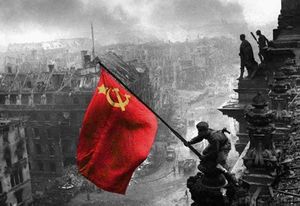Template:Marxism: Difference between revisions
| Line 5: | Line 5: | ||
== Marxism == | == Marxism == | ||
[[Marxism]] is a social, political, and economic philosophy named after [[Karl Marx]] (1818-1883) | [[Marxism]] is a social, political, and economic philosophy named after [[Karl Marx]] (1818-1883). | ||
It is supposed to be a political and economic theory where a society has no classes. No communist system has ever had no class but has always involved oppression of one group by another. | His writings supposedly examine the effects of [[capitalism]] on labor, productivity, and economic development and argues for a worker revolution to overturn [[capitalism]] in favor of [[communism]]. | ||
It is supposed to be a political and economic theory where a society has no classes. It saw the traditional [[family]] as a social obstacle and the private charity and moral guidelines or restrictions as an enemy of the [[social welfare]] [[State]]. | |||
No communist system has ever had no class but has always involved oppression of one group by another. | |||
Marxists consider the material world as an integrated whole in which all things and phenomena are interconnected and interdependent. Whereas, [[socialist]]s believe in equality and abolition of private enterprise. Both require the collective to oppress the individual and when assimilation is inconvenient oppression becomes necessary even if death is the result. | Marxists consider the material world as an integrated whole in which all things and phenomena are interconnected and interdependent. Whereas, [[socialist]]s believe in equality and abolition of private enterprise. Both require the collective to oppress the individual and when assimilation is inconvenient oppression becomes necessary even if death is the result. | ||
The claim is that the main goal of Marxism is to achieve a classless society throughout the world. But this would mean that there are many Capitalist ideologies which would have to be eliminated before this could ever happen making all capitalist a class unto itself. | The claim is that the main goal of Marxism is to achieve a classless society throughout the world. But this would mean that there are many Capitalist ideologies which would have to be eliminated before this could ever happen making all capitalist a class unto itself. | ||
Latest revision as of 10:44, 27 November 2024

"The words Socialism and Communism have the same general meaning" it is only a matter of degree, and hell at any temperature is still hell. They indicate a condition of society in which the wealth of the community: the land and the means of production, distribution and transport are held in common, production being for use and not for profit." In order to reach their classless society they are willing to murder anyone of all classes with another opinion.
Marxism is not a war on more than one class is intended to reduce everyone to slavery.
Sylvia Pankhurst
So in Communism everyone is used and no one profits.
Vladimir Lenin once said, "Under socialism all will govern in turn and will soon become accustomed to no one governing." That has never happened except in the early Church.
Under the totalitarianism produced in communist regimes over 120,000,000 people have lost their lives. Your labor is a natural property right. Communism requires someone other than the individual to rule over a portion of the labor of the most productive for the benefit of the less productive. Under Communism the individual has waived the primary right to choose the manner and amount of distribution of the products of his or her labor to the collective and its enforcers. Under Capitalism charity remains a choice of the individual.
Love is not merely an emotion. Love like electricity or light is an utility. It must move through society as a daily practice in order to remain viable.
The practice of true Love by nature requires both choice and sacrifice.
This would mean that the increase of a dependance upon "legal charity" within a nation will degenerate the masses and cause a decrease in love with a corresponding increase in the manifestation of hate until tyrants rule the land and the people are reduced to perfect savages.
Marxism
Marxism is a social, political, and economic philosophy named after Karl Marx (1818-1883).
His writings supposedly examine the effects of capitalism on labor, productivity, and economic development and argues for a worker revolution to overturn capitalism in favor of communism.
It is supposed to be a political and economic theory where a society has no classes. It saw the traditional family as a social obstacle and the private charity and moral guidelines or restrictions as an enemy of the social welfare State.
No communist system has ever had no class but has always involved oppression of one group by another.
Marxists consider the material world as an integrated whole in which all things and phenomena are interconnected and interdependent. Whereas, socialists believe in equality and abolition of private enterprise. Both require the collective to oppress the individual and when assimilation is inconvenient oppression becomes necessary even if death is the result.
The claim is that the main goal of Marxism is to achieve a classless society throughout the world. But this would mean that there are many Capitalist ideologies which would have to be eliminated before this could ever happen making all capitalist a class unto itself.